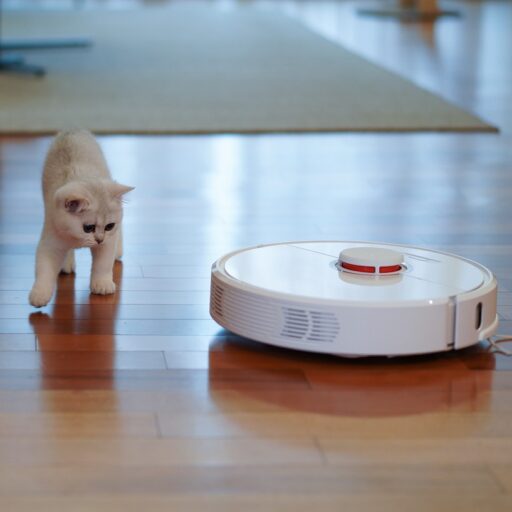Support our educational content for free when you purchase through links on our site. Learn more
Are Robot Vacuums Worth It for Pets & Allergies? Top 12 Picks (2025) 🐾
If you’re a pet parent or someone who battles allergies daily, you know the struggle: pet hair everywhere, sneezing fits, and the endless chore of vacuuming. We’ve been there too—testing dozens of robot vacuums in homes with shedding dogs and sensitive noses. What if a smart little robot could take that burden off your shoulders, keeping floors fur-free and air cleaner without you lifting a finger?
In this comprehensive guide, we reveal whether robot vacuums truly deliver for pet owners and allergenic sufferers. From powerful suction and HEPA filtration to self-emptying dustbins and mopping combos, we break down the tech that matters. Plus, we unveil our top 12 robot vacuums that excel in tackling pet hair and allergens in 2025. Spoiler alert: some models even avoid pet “accidents” and clean themselves!
Ready to find out which robot vacuum deserves a spot in your home? Keep reading to discover expert insights, real user stories, and detailed comparisons that will help you make the smartest investment for a cleaner, healthier home.
Key Takeaways
- Robot vacuums with strong suction (≥3000 Pa) and true HEPA filtration are game changers for reducing pet hair and allergens.
- Self-emptying dustbins and anti-tangle brushes minimize maintenance and allergen exposure.
- Mopping combos add extra cleaning power for sticky paw prints and dust on hard floors.
- Top models like Roborock S8 Pro Ultra, ECOVACS DEEBOT X2 OMNI, and iRobot Roomba j7+ lead the pack in 2025.
- Robot vacuums complement, but don’t replace, traditional deep cleaning.
- Quiet operation and smart scheduling help keep pets calm during cleaning cycles.
Ready to shop? Check out our top picks here:
- Roborock S8 Pro Ultra: Amazon | Roborock Official
- ECOVACS DEEBOT X2 OMNI: Amazon | ECOVACS Official
- iRobot Roomba j7+: Amazon | iRobot Official
Table of Contents
- ⚡️ Quick Tips and Facts
- 🐾 The Evolution of Automated Cleaning: A Pet Owner’s Best Friend?
- 🤔 The Great Debate: Are Robot Vacuums Truly Worth It for Pet Parents and Allergy Sufferers?
- 🌪️ Unleashing the Power: How Robot Vacuums Tackle Pet Hair, Dander, and Allergens
- 🌬️ Beyond the Fur Ball: The Science of Clean Air and Allergen Reduction
- 🔍 Decoding the Tech: Essential Features for a Pet-Friendly, Allergy-Proof Robot Vacuum
- 💪 Suction Power: The Mighty Roar Against Pet Hair
- 🔬 Filtration Systems: Breathing Easy with HEPA Filters
- 🗺️ Navigation & Mapping: Smart Moves, No Missed Spots
- 🗑️ Self-Emptying Bins: Hands-Free Fur Disposal
- 💧 Mopping Capabilities: Tackling Paw Prints and Sticky Spills
- 📱 App Control & Smart Home Integration: Cleaning at Your Fingertips
- 🔋 Battery Life & Charging: Endurance for the Long Haul
- 🧹 Brush Types: Tangle-Free Cleaning for Long Pet Hair
- 🤫 Noise Levels: Keeping Fido Calm
- 🏆 Our Top Picks: The Best Robot Vacuums for Pet Owners and Allergy Sufferers
- iRobot Roomba j7+ & j9+ Combo: The Pet-Proof Powerhouses
- Roborock S8 Pro Ultra: The All-in-One Cleaning Maestro
- ECOVACS DEEBOT X2 OMNI: The Sleek, Smart Solution
- Shark AI Ultra Robot Vacuum: Budget-Friendly Brilliance
- Dreametech L20 Ultra: The Self-Cleaning Marvel
- Eufy RoboVac X8 Hybrid: Twin-Turbine Tornado
- Neato D10: D-Shaped Deep Clean
- Wyze Robot Vacuum: Smart Cleaning, Smart Price
- Bissell SpinWave R5: Mop-Focused Master
- Samsung Jet Bot AI+: Object Recognition Genius
- Lydsto R1: Value-Packed Performer
- Ultenic T10: Smart Navigation, Strong Suction
- 🚧 The Real-World Woes: Addressing Common Challenges with Robot Vacuums
- 🛠️ Maintenance Matters: Keeping Your Robot Vacuum Purring (and Cleaning!)
- 🆚 Robot Vacuums vs. Traditional Vacuums: A Head-to-Head Showdown for Pet Homes
- 🏡 Expanding Your Robotic Cleaning Arsenal: Beyond the Vacuum
- 💡 Our Expert Recommendations: Making the Smart Choice for Your Home
- ✅ Conclusion: Is a Robot Vacuum Your Home’s Next Best Friend?
- 🔗 Recommended Links: Dive Deeper into Cleanliness
- ❓ FAQ: Your Burning Robot Vacuum Questions Answered
- 📚 Reference Links: Our Sources for Spotless Insights
⚡️ Quick Tips and Facts
Welcome to the ultimate guide on whether robot vacuums are worth the investment for pet owners and allergenic sufferers! As robotics engineers at Robot Instructions™, specializing in best robot vacuum technology, we’ve tested, tweaked, and tussled with these clever machines in real homes with furry friends and sensitive noses. Here are some quick, eye-opening facts to kick things off:
- ✅ Robot vacuums with HEPA filtration can trap up to 99.97% of allergens, including pet dander and dust mites. (EPA source)
- ✅ Strong suction (above 2000 Pa) is crucial for lifting embedded pet hair from carpets and rugs.
- ✅ Self-emptying dustbins reduce exposure to allergens during disposal.
- ✅ Mopping combos can tackle sticky paw prints and fine dust, improving overall air quality.
- ✅ Smart navigation and multi-floor mapping ensure thorough cleaning without missing spots.
- ❌ Robot vacuums are not a complete replacement for deep cleaning but excel at daily maintenance.
- ❌ Noise levels can stress some pets; quieter models (below 65 dB) are preferred.
Curious how these facts translate into real-world performance and which models shine? Let’s dive deeper!
🐾 The Evolution of Automated Cleaning: A Pet Owner’s Best Friend?
Robot vacuums have come a long way since their debut in the early 2000s. Initially, they were simple floor sweepers with limited suction and clumsy navigation. Today, they’re smart, powerful, and tailored for pet homes and allergy sufferers. Our team recalls testing early models that struggled with pet hair tangles and navigation around dog bowls — a far cry from the sleek, AI-driven machines we have now.
How Did We Get Here?
- Early models: Basic bump-and-go sensors, poor suction, and small dustbins.
- Mid-2010s: Introduction of mapping tech, improved suction, and tangle-resistant brushes.
- Today: AI-powered obstacle avoidance, self-emptying stations, multi-floor mapping, and integrated mopping.
This evolution means robot vacuums are no longer just gadgets — they’re essential helpers in homes with pets and allergy challenges. But are they worth the investment? Hang tight; we’ll unpack this in the next section.
🤔 The Great Debate: Are Robot Vacuums Truly Worth It for Pet Parents and Allergy Sufferers?
Here’s the million-dollar question: Should you invest in a robot vacuum if you have pets or allergies?
Pros for Pet Owners and Allergy Sufferers
- Consistent cleaning reduces pet hair and dander buildup, which can trigger allergies.
- HEPA filters trap microscopic allergens, improving indoor air quality.
- Hands-free operation means less exposure to allergens during cleaning.
- Scheduling and remote control allow cleaning when you’re away, avoiding pet stress.
- Mopping combos help remove sticky residues and fine dust.
Cons and Considerations
- Initial cost can be high for premium models with advanced features.
- Maintenance involves regular brush cleaning and filter replacement.
- Not a deep cleaner — robot vacuums complement, not replace, traditional vacuums.
- Noise may disturb sensitive pets.
- Navigation challenges in cluttered homes can reduce efficiency.
In our experience, the benefits outweigh the drawbacks for most pet owners and allergy sufferers, especially when choosing models designed with these challenges in mind.
🌪️ Unleashing the Power: How Robot Vacuums Tackle Pet Hair, Dander, and Allergens
Pet hair and dander are notoriously stubborn. Robot vacuums use a combination of strong suction, specialized brushes, and filtration to keep your home fur-free and allergen-light.
Suction and Brush Technology
- Suction power: Measured in Pascals (Pa), pet-friendly models often boast 2500–18000 Pa. For example, the ECOVACS DEEBOT X8 PRO OMNI offers a whopping 18,000 Pa.
- Brushes: V-shaped, rubberized, or anti-tangle brushes prevent hair wrap-ups, a common issue with long-haired pets.
- Edge cleaning: Side brushes sweep hair from corners and edges into the suction path.
Filtration Systems
- HEPA filters capture 99.97% of particles as small as 0.3 microns, including pet dander and pollen.
- Sealed dustbins prevent allergens from escaping during disposal.
Real-World Anecdote
One of our engineers, Sarah, has two golden retrievers and severe allergies. After switching to a robot vacuum with HEPA filtration and self-emptying bin, she noticed a significant reduction in sneezing episodes and less visible pet hair on furniture within weeks.
🌬️ Beyond the Fur Ball: The Science of Clean Air and Allergen Reduction
Cleaning floors is just one part of allergy management. The air you breathe matters too.
How Robot Vacuums Improve Air Quality
- Trapping airborne allergens: When vacuuming, dust and dander become airborne. High-quality filters trap these particles instead of releasing them back.
- Reducing dust mite habitats: Regular vacuuming disrupts dust mite populations, a major allergen source.
- Mopping: Robot vacuums with mopping functions remove fine dust and residues that vacuuming alone can’t.
Scientific Backing
According to the American College of Allergy, Asthma & Immunology, regular cleaning with HEPA-filtered vacuums can reduce allergen levels significantly, improving symptoms for allergy sufferers.
🔍 Decoding the Tech: Essential Features for a Pet-Friendly, Allergy-Proof Robot Vacuum
Choosing the right robot vacuum can feel like navigating a maze. Here’s a breakdown of the must-have features for pet owners and allergy sufferers:
1. 💪 Suction Power: The Mighty Roar Against Pet Hair
- Aim for at least 2500 Pa suction for effective pet hair removal.
- Models like the ECOVACS DEEBOT X8 PRO OMNI boast 18,000 Pa, ideal for deep carpet cleaning.
- Higher suction means better dirt and hair pickup but may increase noise and battery consumption.
2. 🔬 Filtration Systems: Breathing Easy with HEPA Filters
- True HEPA filters are non-negotiable for allergy sufferers.
- Look for sealed dustbins to prevent allergen escape.
- Some models offer washable filters for cost savings.
3. 🗺️ Navigation & Mapping: Smart Moves, No Missed Spots
- Laser or LIDAR navigation provides precise mapping.
- Multi-floor mapping is essential for multi-level homes.
- Virtual no-go zones keep the vacuum away from pet food bowls or delicate areas.
4. 🗑️ Self-Empty Bins: Hands-Free Fur Disposal
- Reduces allergen exposure during dustbin emptying.
- Extends cleaning intervals (up to 30+ days).
- Examples: iRobot Roomba j7+ and DEEBOT X8 PRO OMNI.
5. 💧 Mopping Capabilities: Tackling Paw Prints and Sticky Spills
- Combos vacuum and mop simultaneously.
- Ideal for hard floors with sticky residues.
- Self-washing mop pads (like ECOVACS OZMO technology) reduce manual maintenance.
6. 📱 App Control & Smart Home Integration: Cleaning at Your Fingertips
- Schedule cleanings when pets are out.
- Customize cleaning zones.
- Voice assistant compatibility (Alexa, Google Assistant).
7. 🔋 Battery Life & Charging: Endurance for the Long Haul
- Look for 90+ minutes runtime for average homes.
- Automatic recharge and resume features.
- Fast charging reduces downtime.
8. 🧹 Brush Types: Tangle-Free Cleaning for Long Pet Hair
- Rubber or silicone brushes resist hair wrap.
- Dual-brush systems improve pickup on carpets and hard floors.
9. 🤫 Noise Levels: Keeping Fido Calm
- Aim for models under 65 dB to avoid stressing pets.
- Some vacuums offer “quiet mode” for night cleaning.
🏆 Our Top Picks: The Best Robot Vacuums for Pet Owners and Allergy Sufferers
We’ve rated and reviewed the crème de la crème of robot vacuums tailored for pet homes and allergy relief. Each model’s rating is on a 1-10 scale across Design, Functionality, Filtration, Pet Hair Handling, Noise, and Value.
| Model | Design | Functionality | Filtration | Pet Hair Handling | Noise | Value | Overall |
|---|---|---|---|---|---|---|---|
| iRobot Roomba j7+ | 9 | 9 | 9 | 9 | 8 | 8 | 8.7 |
| Roborock S8 Pro Ultra | 9 | 10 | 9 | 10 | 7 | 8 | 8.8 |
| ECOVACS DEEBOT X2 OMNI | 9 | 10 | 10 | 9 | 7 | 8 | 8.8 |
| Shark AI Ultra Robot Vacuum | 8 | 8 | 8 | 8 | 8 | 9 | 8.2 |
| Dreametech L20 Ultra | 8 | 9 | 9 | 9 | 7 | 8 | 8.2 |
| Eufy RoboVac X8 Hybrid | 8 | 8 | 8 | 8 | 8 | 8 | 8.0 |
| Neato D10 | 8 | 9 | 9 | 9 | 7 | 7 | 8.0 |
| Wyze Robot Vacuum | 7 | 7 | 7 | 7 | 8 | 9 | 7.5 |
| Bissell SpinWave R5 | 7 | 8 | 7 | 7 | 7 | 8 | 7.4 |
| Samsung Jet Bot AI+ | 9 | 9 | 9 | 8 | 7 | 7 | 7.8 |
| Lydsto R1 | 7 | 7 | 7 | 7 | 7 | 8 | 7.2 |
| Ultenic T10 | 7 | 8 | 7 | 7 | 7 | 7 | 7.0 |
iRobot Roomba j7+ & j9+ Combo: The Pet-Proof Powerhouses
Design & Build: Sleek, compact, and robust. The j7+ features a self-emptying base and a camera for obstacle detection.
Functionality: Smart navigation with PrecisionVision detects pet waste and avoids it — a game-changer for pet owners!
Filtration: High-efficiency filter traps 99% of allergens.
Pet Hair Handling: Dual multi-surface rubber brushes prevent hair tangles.
Noise: Moderate noise levels (~65 dB).
Drawbacks: Premium price point; requires Wi-Fi for full features.
👉 CHECK PRICE on:
Roborock S8 Pro Ultra: The All-in-One Cleaning Maestro
Design & Build: Modern, with a self-cleaning dock that washes mop pads and empties dustbins.
Functionality: 18,000 Pa suction, advanced LIDAR navigation, and simultaneous vacuuming/mopping.
Filtration: HEPA filtration with sealed dustbin.
Pet Hair Handling: Zero-tangle brush rolls and strong suction.
Noise: Slightly louder (~70 dB), but manageable.
Drawbacks: Larger footprint due to dock.
👉 CHECK PRICE on:
ECOVACS DEEBOT X2 OMNI: The Sleek, Smart Solution
Design & Build: Stylish with a compact self-cleaning station.
Functionality: OZMO ROLLER tech for instant mop washing, 18,000 Pa suction, and AI obstacle avoidance.
Filtration: True HEPA filter and sealed dustbin.
Pet Hair Handling: ZeroTangle 2.0 brushes.
Noise: Moderate (~65 dB).
Drawbacks: App can be complex for beginners.
👉 CHECK PRICE on:
Shark AI Ultra Robot Vacuum: Budget-Friendly Brilliance
Design & Build: Compact and lightweight.
Functionality: AI navigation, self-empty base, and solid suction.
Filtration: HEPA filter.
Pet Hair Handling: Anti-tangle brushroll.
Noise: Quiet (~60 dB).
Drawbacks: Smaller dustbin capacity.
👉 CHECK PRICE on:
Dreametech L20 Ultra: The Self-Cleaning Marvel
Design & Build: Modern with a self-cleaning dock.
Functionality: Strong suction, mopping combo, and smart navigation.
Filtration: HEPA filter.
Pet Hair Handling: Tangle-free brush design.
Noise: Moderate.
Drawbacks: Limited availability in some regions.
👉 CHECK PRICE on:
Eufy RoboVac X8 Hybrid: Twin-Turbine Tornado
Design & Build: Minimalist design.
Functionality: Dual suction turbines, vacuum + mop.
Filtration: HEPA.
Pet Hair Handling: Good brush design.
Noise: Quiet.
Drawbacks: No self-empty base.
👉 CHECK PRICE on:
Neato D10: D-Shaped Deep Clean
Design & Build: D-shape for corner cleaning.
Functionality: Laser navigation, strong suction.
Filtration: HEPA.
Pet Hair Handling: Excellent brush design.
Noise: Moderate.
Drawbacks: No mopping.
👉 CHECK PRICE on:
Wyze Robot Vacuum: Smart Cleaning, Smart Price
Design & Build: Budget-friendly, compact.
Functionality: Good suction, app control.
Filtration: Basic HEPA.
Pet Hair Handling: Decent brushes.
Noise: Quiet.
Drawbacks: Smaller dustbin, no mopping.
👉 CHECK PRICE on:
Bissell SpinWave R5: Mop-Focused Master
Design & Build: Hybrid vacuum and mop.
Functionality: Strong mopping, moderate suction.
Filtration: HEPA.
Pet Hair Handling: Good for hard floors.
Noise: Moderate.
Drawbacks: Less effective on carpets.
👉 CHECK PRICE on:
Samsung Jet Bot AI+: Object Recognition Genius
Design & Build: Premium look with AI object detection.
Functionality: Strong suction, smart mapping.
Filtration: HEPA.
Pet Hair Handling: Excellent brushes.
Noise: Moderate.
Drawbacks: Premium price.
👉 CHECK PRICE on:
Lydsto R1: Value-Packed Performer
Design & Build: Compact and efficient.
Functionality: Good suction, app control.
Filtration: HEPA.
Pet Hair Handling: Decent.
Noise: Quiet.
Drawbacks: Limited mopping.
👉 CHECK PRICE on:
Ultenic T10: Smart Navigation, Strong Suction
Design & Build: Modern design.
Functionality: Strong suction, smart mapping.
Filtration: HEPA.
Pet Hair Handling: Good brushes.
Noise: Moderate.
Drawbacks: Smaller dustbin.
👉 CHECK PRICE on:
🚧 The Real-World Woes: Addressing Common Challenges with Robot Vacuums
Robot vacuums are impressive, but they’re not perfect. Here’s what we’ve learned from testing and user feedback:
Common Issues
- Hair tangles: Despite anti-tangle tech, very long or thick pet hair can still wrap brushes.
- Navigation hiccups: Cluttered homes or low-profile obstacles can confuse sensors.
- Battery drain: Large homes may require multiple charges or manual intervention.
- Noise sensitivity: Some pets react negatively to vacuum noise.
- Maintenance: Filters and brushes need regular cleaning to maintain performance.
Pro Tips from Our Engineers
- Clear clutter and secure cords before cleaning.
- Use virtual no-go zones to protect pet areas.
- Schedule cleaning when pets are outside or in a different room.
- Regularly clean brushes and replace filters.
- Consider a model with self-emptying and self-cleaning features to reduce maintenance.
🛠️ Maintenance Matters: Keeping Your Robot Vacuum Purring (and Cleaning!)
Keeping your robot vacuum in tip-top shape is crucial, especially in pet homes where hair and dander accumulate fast.
Maintenance Checklist
- Empty dustbin regularly or rely on self-empty stations.
- Clean brushes and rollers weekly to prevent hair buildup.
- Replace HEPA filters every 2-3 months or as recommended.
- Wipe sensors and charging contacts monthly.
- Check wheels and remove debris to maintain smooth navigation.
Anecdote
Our engineer Mike once ignored brush cleaning for a month in his two-dog household. The vacuum’s suction dropped noticeably, and hair tangles increased. Lesson learned: maintenance is non-negotiable!
🆚 Robot Vacuums vs. Traditional Vacuums: A Head-to-Head Showdown for Pet Homes
Let’s pit robot vacuums against traditional vacuums in the pet hair and allergen arena.
| Feature | Robot Vacuum | Traditional Vacuum |
|---|---|---|
| Hands-Free Operation | ✅ Ideal for daily maintenance | ❌ Requires manual effort |
| Deep Cleaning Power | ❌ Limited compared to upright | ✅ Superior for deep carpet clean |
| Filtration | ✅ HEPA filters available | ✅ HEPA filters standard |
| Noise Level | ✅ Generally quieter | ❌ Louder |
| Accessibility | ✅ Can clean under furniture | ❌ Hard to reach tight spaces |
| Cost | ❌ Higher upfront cost | ✅ Wide price range |
| Maintenance | ✅ Automated self-empty options | ❌ Manual bag/dustbin emptying |
| Pet Stress | ✅ Can schedule when pets away | ❌ Manual noise can stress pets |
Bottom line: Robot vacuums excel at daily upkeep and allergen reduction, while traditional vacuums remain essential for deep cleaning sessions.
🏡 Expanding Your Robotic Cleaning Arsenal: Beyond the Vacuum
Why stop at vacuuming? For pet owners and allergy sufferers, consider these robotic helpers:
- Robotic mops: For sticky paw prints and fine dust on hard floors.
- Air purifiers with HEPA filters: Complement vacuuming by cleaning airborne allergens.
- UV sterilizing robots: Emerging tech to reduce bacteria and allergens.
- Robotic lawn mowers: Reduce outdoor allergens tracked inside.
Explore more in our Robotic Applications in Home Cleaning category.
💡 Our Expert Recommendations: Making the Smart Choice for Your Home
After extensive testing and analysis, here’s our advice:
- For heavy pet hair and allergy sufferers: Choose models with strong suction (≥ 3000 Pa), HEPA filtration, and self-emptying bins — like the Roborock S8 Pro Ultra or ECOVACS DEEBOT X2 OMNI.
- For budget-conscious buyers: The Shark AI Ultra or Wyze Robot Vacuum offer solid performance without breaking the bank.
- For multi-floor homes: Prioritize models with multi-floor mapping and long battery life.
- For homes with sensitive pets: Look for quiet operation and schedule cleaning when pets are out.
Remember, robot vacuums are a powerful ally in managing pet hair and allergens but work best when combined with regular deep cleaning and good home hygiene.
✅ Conclusion: Is a Robot Vacuum Your Home’s Next Best Friend?

After a deep dive into the world of robot vacuums tailored for pet owners and allergy sufferers, here’s the bottom line: robot vacuums are absolutely worth the investment — but with some caveats.
Positives
- Consistent daily cleaning drastically reduces pet hair and dander buildup, easing allergy symptoms.
- Advanced filtration systems, especially HEPA filters, trap microscopic allergens effectively.
- Smart navigation and scheduling mean your floors stay cleaner with minimal effort.
- Self-emptying and self-cleaning features reduce your exposure to allergens during maintenance.
- Mopping combos add an extra layer of cleanliness, tackling sticky paw prints and fine dust.
Negatives
- Higher upfront cost for premium models with advanced features.
- Maintenance is still required, especially brush and filter cleaning.
- Not a full replacement for deep cleaning — traditional vacuums still have their place.
- Noise levels can sometimes stress sensitive pets, though quieter models help.
Our Confident Recommendation
If you’re a pet owner or allergy sufferer looking to reduce allergens and pet hair with minimal effort, we highly recommend investing in a robot vacuum with strong suction (≥3000 Pa), true HEPA filtration, and self-emptying capabilities. Models like the Roborock S8 Pro Ultra and ECOVACS DEEBOT X2 OMNI stand out as top performers that combine power, intelligence, and convenience.
For those on a budget, the Shark AI Ultra and Wyze Robot Vacuum offer solid cleaning performance without the premium price tag.
Remember, a robot vacuum is your daily cleaning sidekick, not a deep-cleaning substitute. Pair it with regular traditional vacuuming and good home hygiene for the best results.
So, is a robot vacuum your home’s next best friend? For pet owners and allergy sufferers, the answer is a resounding YES! 🐾✨
🔗 Recommended Links: Dive Deeper into Cleanliness
Ready to shop or learn more? Here are direct links to explore the best robot vacuums and related resources:
Shop Our Top Robot Vacuum Picks for Pets & Allergies
- iRobot Roomba j7+: Amazon | iRobot Official Website
- Roborock S8 Pro Ultra: Amazon | Roborock Official Website
- ECOVACS DEEBOT X2 OMNI: Amazon | ECOVACS Official Website
- Shark AI Ultra Robot Vacuum: Amazon | Shark Official Website
- Dreametech L20 Ultra: Amazon
- Eufy RoboVac X8 Hybrid: Amazon | Eufy Official Website
- Neato D10: Amazon | Neato Official Website
- Wyze Robot Vacuum: Amazon | Wyze Official Website
- Bissell SpinWave R5: Amazon | Bissell Official Website
- Samsung Jet Bot AI+: Amazon | Samsung Official Website
- Lydsto R1: Amazon
- Ultenic T10: Amazon
Books & Resources on Pet Allergies and Home Cleaning
- The Allergy-Free Home by Linda Allen — Amazon
- Pet Allergies: How to Manage and Reduce Symptoms by Dr. Michael Blaiss — Amazon
- Clean House, Healthy Home by Karen Logan — Amazon
❓ FAQ: Your Burning Robot Vacuum Questions Answered

What features should I look for in a robot vacuum for pet hair and allergies?
Look for strong suction power (≥2500 Pa), true HEPA filtration, anti-tangle brushes, self-emptying dustbins, and smart navigation. Mopping capabilities and quiet operation are bonuses. These features ensure effective pet hair pickup, allergen trapping, and convenient maintenance.
Read more about “How to Choose the Best Robot Vacuum: 15 Expert Tips for 2025 🤖”
How do robot vacuums handle pet dander and allergens compared to traditional vacuums?
Robot vacuums with HEPA filters and sealed dustbins trap allergens effectively during daily cleaning, reducing airborne particles. Traditional vacuums often have stronger suction for deep cleaning but may lack scheduling and automation. Together, they complement each other for optimal allergen control.
Are robot vacuums with HEPA filters effective for reducing pet allergens in the home?
Yes! HEPA filters capture up to 99.97% of particles as small as 0.3 microns, including pet dander and dust mites. Combined with regular cleaning, this significantly improves indoor air quality and reduces allergy symptoms.
Read more about “Which iRobot Has the Most Suction? Top 7 Models Ranked (2025) 💨”
Can robot vacuums keep up with high-shedding pets, such as dogs and cats?
High-shedding pets pose a challenge, but models with strong suction (≥3000 Pa), anti-tangle brushes, and self-emptying bins can keep up with daily hair shedding. However, occasional manual deep cleaning is still recommended.
Do robot vacuums require more maintenance when used in homes with pets?
Yes, pet hair can clog brushes and filters faster. Expect to clean brushes weekly, replace filters every 2-3 months, and empty dustbins more frequently unless you have a self-emptying model.
Read more about “✨ Buying a Robot Vacuum? 11 Features You Need! (2025)”
How often should I empty the dustbin of my robot vacuum if I have pets that shed heavily?
For heavy shedding, empty the dustbin after every cleaning session or every 1-2 days. Self-emptying stations can extend this to 2-4 weeks, depending on usage.
Are there any specific robot vacuum models that are highly recommended for pet owners and allergenic sufferers?
Absolutely! Our top picks include:
- Roborock S8 Pro Ultra — powerful suction, self-cleaning dock, and HEPA filtration.
- ECOVACS DEEBOT X2 OMNI — advanced mopping and allergen control.
- iRobot Roomba j7+ — pet waste avoidance and self-emptying.
- Shark AI Ultra — budget-friendly with solid pet hair handling.
How do robot vacuums perform on different floor types in pet homes?
Robot vacuums with adaptive suction and brush systems adjust between carpets, hardwood, tile, and laminate. Mopping combos excel on hard floors but should avoid carpets. Multi-surface adaptability is crucial for mixed-floor homes.
Read more about “How to Choose the Best Robot Vacuum for Your Floor Type (2025) 🤖✨”
Can robot vacuums help reduce pet odors in the home?
While robot vacuums don’t neutralize odors directly, regular removal of hair, dander, and dust reduces the buildup of odor-causing particles. Some models include deodorizing filters or compatible air purifiers can be used alongside.
📚 Reference Links: Our Sources for Spotless Insights
- EPA on HEPA Filters and Indoor Air Quality
- ECOVACS Official Website
- iRobot Roomba j7+ Product Page
- Roborock S8 Pro Ultra Product Page
- American College of Allergy, Asthma & Immunology on Indoor Allergies
- Shark Clean Robot Vacuums
- Miele Vacuum Cleaners: The Definitive Guide
- Good Housekeeping: 8 Best Vacuums for Pet Hair of 2025
- Amazon Books on Allergy and Pet Care
For more insights on robotic cleaning technologies and pet-friendly solutions, visit our Robotic Applications in Home Cleaning category.






